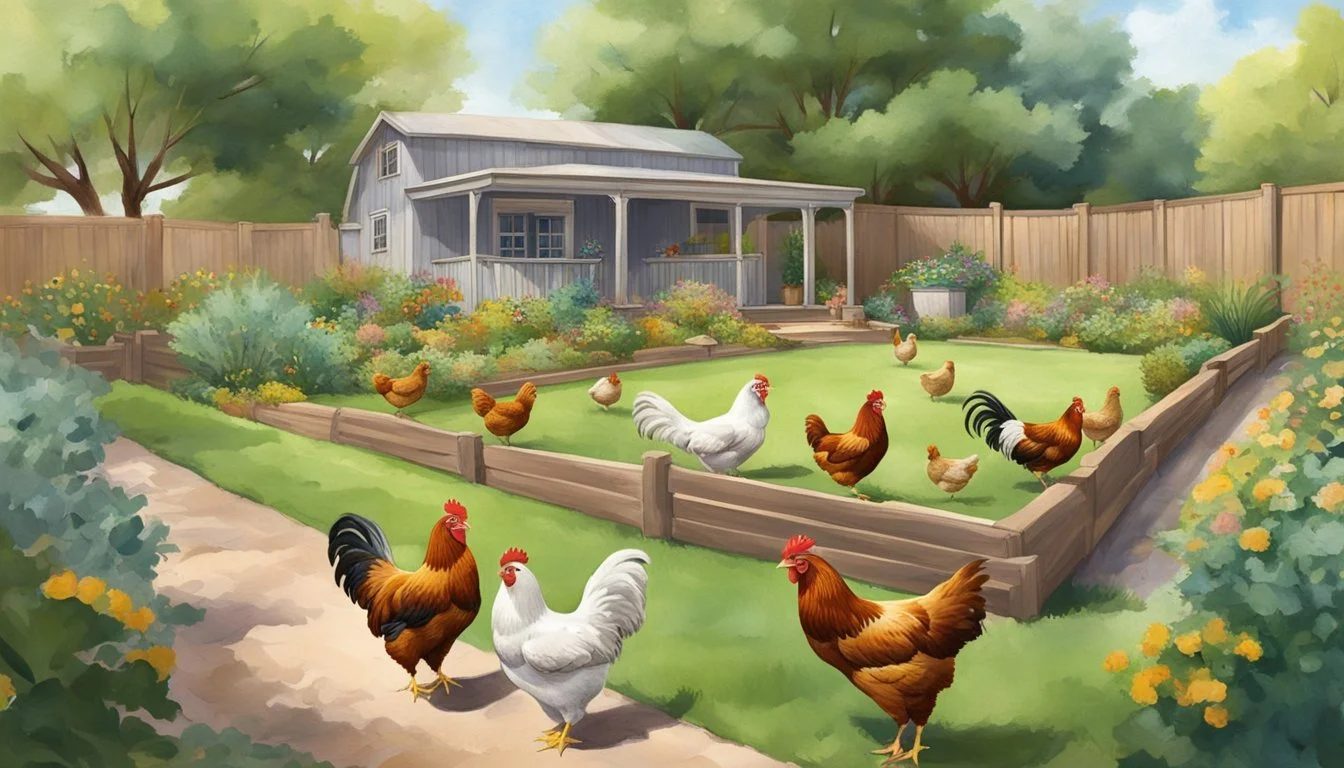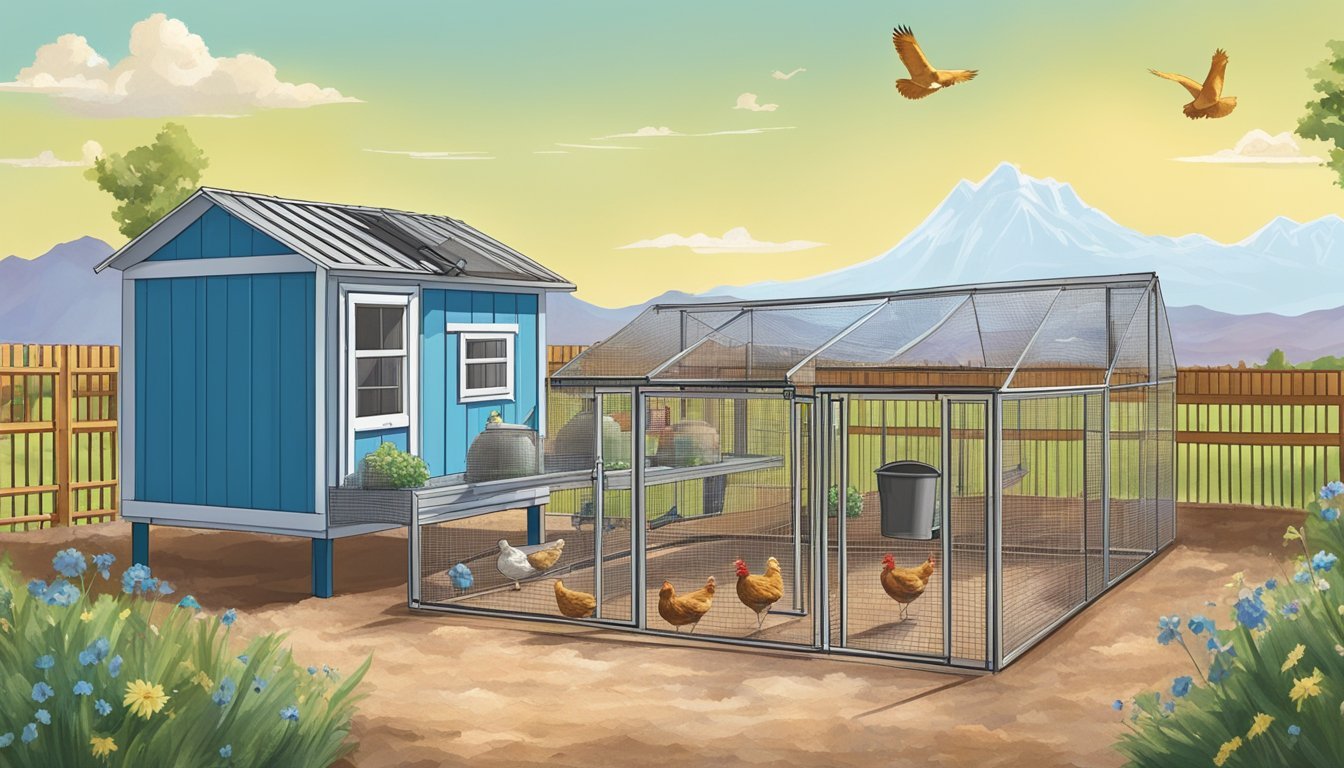Keeping Backyard Chickens in Las Cruces, NM
Essential Tips for Beginners
Keeping backyard chickens has become a popular practice for many residents in Las Cruces, New Mexico, providing a source of fresh eggs and the enjoyment of caring for these animals. However, the City of Las Cruces has set specific regulations that guide the legalities of owning and managing poultry within city limits. These rules are designed to create a harmonious balance between animal welfare, neighborhood aesthetics, and public health concerns.
Las Cruces residents interested in raising backyard chickens must comply with the city's animal ordinance. This includes obtaining a special permit before keeping chickens or ducks in residential areas. The permit process ensures that all poultry keepers meet the required standards for animal care and housing. Furthermore, there are restrictions on the number of animals allowed based on property size, and stipulations that housing for the chickens must be kept clean and orderly to prevent nuisances or health issues.
Adherence to these regulations not only supports the welfare of the chickens but also contributes to responsible animal ownership and community well-being. It's important for potential and current chicken owners to stay informed about the latest requirements and to understand their responsibilities in maintaining their flocks within the guidelines established by the City of Las Cruces.
Legal Framework for Backyard Poultry
Backyard poultry keeping in Las Cruces, NM, is governed by specific municipal ordinances that regulate the number of animals allowed and the process of obtaining the necessary permits.
Las Cruces Chicken Ordinance Overview
In Las Cruces, the keeping of chickens falls under city animal ordinances designed to encourage responsible ownership and ensure animal welfare. The City Council has set forth codes that stipulate the amount of space required for poultry and the maximum quantity permitted. The city's ordinance allows for the keeping of chickens within city limits, provided that residents adhere strictly to the regulations in place.
Permit Requirements and Application Process
Residents must acquire a special permit if their property is not zoned for livestock. Obtaining this permit involves an application process that includes an application fee, with possible annual fees for renewal. The City of Las Cruces' codes enforcement is actively involved in ensuring compliance with the law, and it is essential to follow proper procedures as monitored by city officials.
Application Fee: Small, one-time fee for processing.
Annual Fee: Potentially required to maintain permit validity.
Species-Specific Regulations and Limitations
The city has species-specific regulations, particularly noting that while chickens and ducks are allowed, roosters may be restricted due to noise concerns. Additionally, other fowl such as turkeys might be subject to different limitations or could be prohibited entirely. Residents should check the current ordinance for any updates to these regulations. It is imperative to understand and follow these rules to avoid penalties or the removal of the animals by authorities.
Setting Up Your Chicken Coop
Setting up a chicken coop in Las Cruces, NM, requires attention to detail, from selecting a proper location to ensuring the health and safety of the chickens. The coop must cater to the birds' needs, protect against predators, and maintain hygiene to prevent health hazards.
Selecting a Location and Design
Choosing the right location for a chicken coop hinges on several factors. Adequate space is critical, with Las Cruces regulations suggesting half an acre or more for small animals. The area should provide natural light, protection from extreme weather, and ease of access for cleaning and maintenance. As for the coop design, it should offer about 4 square feet per chicken inside the coop, and ample space in the run, which is a minimum of 10 square feet per bird.
Protection Against Predators
In Las Cruces, protecting chickens from predators is crucial. Coops should be fortified with sturdy materials to withstand intrusion. This can include:
Fencing: A secure fence that is buried at least 12 inches deep to prevent digging by predators such as foxes.
Locks: Use of hardware cloth instead of chicken wire to prevent predators from reaching through.
Roofing: A solid or wire-mesh roof to deter aerial predators like hawks or owls.
One should regularly inspect the coop for possible vulnerabilities and promptly address them.
Ensuring Proper Health and Sanitation
The health of backyard chickens is paramount. Ventilation is a key component of coop design; it requires 1 square foot of ventilation per bird to maintain air quality without creating drafts. A clean coop reduces the risk of disease and pest infestation. Daily removal of droppings, along with regular changes of bedding and disinfection of waterers and feeders, is recommended.
Furthermore, obtaining a special permit, as required by Las Cruces ordinance, ensures the owner adheres to proper legal standards, promoting overall health and sanitation for the chickens.
Daily Management and Care
The health and productivity of backyard chickens in Las Cruces depend on diligent daily management and care. This includes proper feeding, monitoring health, and handling eggs with care to ensure the well-being of the livestock.
Feeding and Nutrition
Chickens require a balanced diet to maintain their health and egg production. Owners should provide a consistent supply of commercial poultry feed, which is formulated with the necessary nutrients. Access to clean water 24/7 is critical.
Daily Feed Requirements: Provide approximately 1/4 pound of feed per chicken.
Supplements: Offer crushed oyster shell for added calcium and grit to aid digestion.
Health Monitoring and Veterinary Needs
Regular health checks are vital to catch issues early.
Observation: Examine chickens daily for signs of distress or illness, such as changes in behavior or appearance.
Veterinary Care: Establish a relationship with a vet who is experienced with poultry for vaccinations and treatment of any ailments.
Egg Collection and Handling
Eggs should be collected regularly to ensure freshness and minimize the risk of contamination.
Collection Frequency: Gather eggs at least once a day.
Cleaning: Wipe eggs with a dry cloth; if necessary, use a damp cloth and dry immediately.
Proper care not only supports the health of the chickens but also maximizes the quality and safety of the eggs they produce.
Community Relations and Responsibilities
Keeping backyard chickens in Las Cruces, NM requires consideration towards community well-being and adherence to local animal control regulations to maintain harmony.
Fostering Good Neighbor Relations
Residents with backyard chickens are encouraged to communicate with their neighbors. This includes sharing plans about keeping chickens and being open to addressing any concerns. Transparency helps in building trust and reducing misunderstandings. They should make sure the coop is well-maintained and does not detract from the neighborhood's appearance.
Addressing Noise and Odor Complaints
To minimize disturbances, chicken keepers must manage noise and control odors:
Noise: Use of soundproofing materials in the coop and maintaining a reasonable distance from neighbors' living spaces can help in reducing noise levels.
Odor: Regular cleaning of the coop and proper waste management are vital. Composting chicken waste can reduce odors and provide garden compost.
If complaints arise, residents must respond promptly and courteously, working with Animal Control if necessary. James Chavez, a local resident, exemplifies this practice by implementing a diligent weekly cleaning schedule to prevent odor complaints from neighbors.
Handling Lost or Escaped Birds
In an event where birds escape, the owner must search for and retrieve their chickens as quickly as possible. Chickens found wandering off-property can lead to concerns from neighbors and might involve Animal Control. Immediate action demonstrates responsible ownership and respect for community safety and comfort.
Considerations for Urban Chicken Farming
When considering urban chicken farming in Las Cruces, NM, it's important to focus on the benefits and challenges including local ordinances, space requirements, and popular misconceptions.
Benefits of Urban Chicken Farming
Urban chicken farming in Las Cruces provides numerous advantages. Fresh Eggs are a significant benefit, with chickens offering a steady supply of fresh, nutritional eggs. The Sustainability Aspect is also a benefit, as local egg production reduces reliance on store-bought eggs, which reduces food miles and carbon footprint.
Educational Value: Keeping chickens can offer a unique learning experience for all ages, teaching about animal care and food sources.
Insect Control: Chickens can help control pests naturally, benefiting a backyard ecosystem.
Challenges and Common Misconceptions
Several challenges accompany urban chicken farming. Space Constraints often lead to a cap on the number of chickens one can keep. According to local ordinances, there's a minimum square footage required for poultry to ensure their welfare.
Predator Protection: Proper shelter is mandatory to protect chickens from predators, a concern for urban areas.
Waste Management: Managing chicken waste to minimize odor and maintain cleanliness is a must.
Noise Levels: Chickens can be noisy, and one must consider the potential for noise complaints from neighbors.
Contrary to common misconceptions, urban chicken farming does not necessarily result in significant odor or noise if managed properly. Chickens can be less noisy than commonly thought, and when coops are cleaned regularly, odor can be significantly minimized.
Support and Resources
For residents of Las Cruces, New Mexico, embarking on the journey of keeping backyard chickens means having access to a supportive community as well as a variety of resources available for both novice and experienced backyard poultry enthusiasts.
Local Organizations and Networks
Organizations such as Horse N' Hound Feed N' Supply play a pivotal role in providing supplies and expertise for aspiring and current chicken owners. They not only offer necessary feed and equipment but also can serve as a hub for connecting with other poultry enthusiasts in Las Cruces. BackYard Chickens (BYC) is another valuable resource, offering an online platform where homeowners can connect, share experiences, and seek advice on best practices for keeping backyard chickens.
Key Contacts for Local Support:
Horse N' Hound Feed N' Supply: Local supply store with knowledgeable staff.
BackYard Chickens (BYC): Online community for shared learning.
Educational Materials and Workshops
For those looking to deepen their knowledge, educational materials and workshops can provide comprehensive information on the care and management of backyard poultry. Chicks 101 is an example of a program that may be offered, aimed at giving beginners a solid foundation in chicken care. These workshops typically cover topics such as coop construction, dietary needs, health issues, and local laws pertaining to poultry.
Educational Opportunities:
Workshops: Local events like Chicks 101 can educate on basic care.
Online Resources: BYC and other websites offer articles, forums, and guides.
By leveraging these local organizations and educational resources, residents of Las Cruces can ensure they are well-equipped to provide a healthy and legal environment for their backyard chickens.







